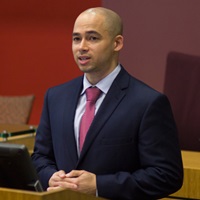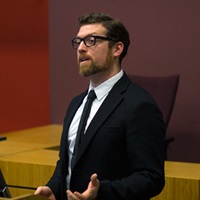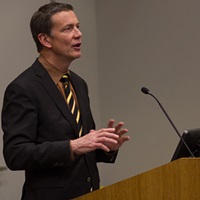Faculty from law, psychology, criminology and public health gathered for a conference that explored crime and justice from diverse disciplines.
Woodson, who organized the conference, said the April 1 event was designed both to highlight Drexel’s institutional strengths in a variety of disciplines and to give scholars an opportunity to exchange ideas.
 “Crime and justice is an incredibly urgent and compelling issue,” Woodson said, noting that future conferences will focus on many areas in which scholars from diverse fields can collaborate.
“Crime and justice is an incredibly urgent and compelling issue,” Woodson said, noting that future conferences will focus on many areas in which scholars from diverse fields can collaborate.
Professor Adam Benforado led off a panel moderated by Professor Kevin Woodson that explored deficits in traditional understandings of law and criminal justice, discussing findings from his book, “Unfair: The New Science of Criminal Injustice,” which explored the unseen biases that influence victims, suspects, witnesses, police, prosecutors, judges and juries in criminal cases. Guided by erroneous assumptions about human behavior, Benforado said, police commonly draw false confessions from the innocent. Meanwhile, he said, prosecutors commonly convince themselves that it’s acceptable to withhold exculpatory evidence in order to present unambiguous cases to juries and protect the public from danger.
Citing the role of drug abuse and mental illness in mass incarceration, Professor David DeMatteo, who directs the JD-PhD Program in Law and Psychology, noted that the largest facilities in the U.S. that house individuals who are mentally ill are Rikers Island in New York City, the Cook County Jail in Chicago and the Los Angeles County Jail in California. DeMatteo presented studies demonstrating that drug courts and pre-arrest diversion programs that combine mental health services with supervision can curb arrests and recidivism among mentally ill and addicted inmates.
 Similarly, Professor Jordan Hyatt of the Department of Criminology and Justice cited research showing that community supervision to ex-offenders is far more likely to discourage future arrests when tailored to specific offenders’ circumstances and needs. Probation and parole systems guided solely by the aim of reducing risks for the community should be reconsidered in favor of evidence-based programs, Hyatt said, citing research showing that the combination of cognitive therapy with less intensive supervision deters many parolees from re-offending.
Similarly, Professor Jordan Hyatt of the Department of Criminology and Justice cited research showing that community supervision to ex-offenders is far more likely to discourage future arrests when tailored to specific offenders’ circumstances and needs. Probation and parole systems guided solely by the aim of reducing risks for the community should be reconsidered in favor of evidence-based programs, Hyatt said, citing research showing that the combination of cognitive therapy with less intensive supervision deters many parolees from re-offending.
Senior Associate Dean and Professor Dan Filler kicked off the afternoon panel moderated by Professor Rose Corrigan on crafting informed policies by noting that individual narratives can play an outsized role in criminal justice.
“Stories are very motivating,” said Filler, who has studied the role of social anxiety in adopting laws and defining aggravating factors, such as killing mail carriers or killing individuals who are sitting in a car. Where laws have commonly reflected popular sentiment, Filler said, policy makers should be guided by empirical evidence. Scholarly discourse concerning law and society can help create an evidence-based system that would be more just, Filler added.
Kevin Bethel, a retired Philadelphia deputy police commissioner and current Stoneleigh fellow, and Professor Naomi Goldstein of the Psychology Department discussed strategies for addressing a school-to-prison pipeline that developed through “zero tolerance” policies in the Philadelphia School District. A partnership was created between the Police Department to the courts, the public defender, the District Attorney’s Office, the school district, and other human service agencies, Bethel said. Ninety percent of the parents who were offered a combination of social services, mentoring, recreational and vocational readiness activities for their children, Bethel added. While there were 1,582 in-school arrests in 2013-14 before the program launch, Goldstein said, those arrests tumbled to 724 in the program’s first year and they are expected to tally fewer than 400 at the end of the current academic year.

Executive Vice Provost James Herbert said in a keynote address that it is critical to bring together scholars from diverse disciplines and to “deconstruct those silos” that separate faculty in different fields.
“The problems of the 21st century are to going to solved by people in one single discipline,” Herbert said, noting that the University is promoting interdisciplinary work by facilitating joint hires across department and schools, encouraging joint programs such as the JD-PhD in Law and Psychology, supporting the Drexel Areas of Research Excellence initiative and constructing a new building that will house diverse physical sciences.